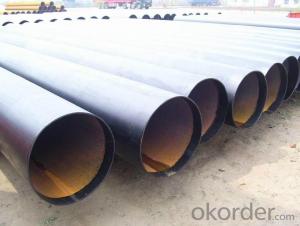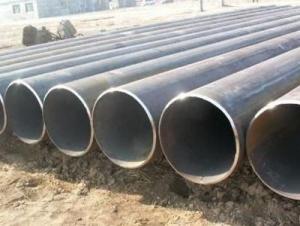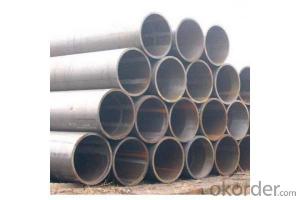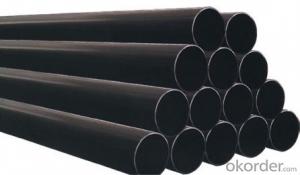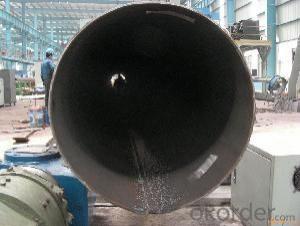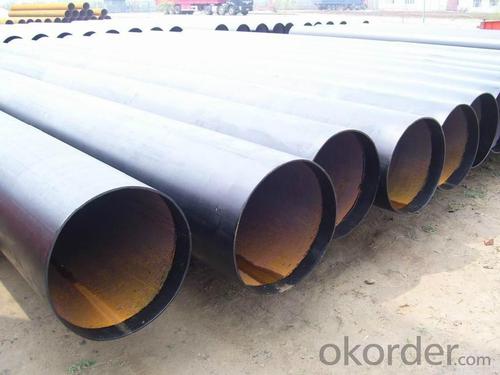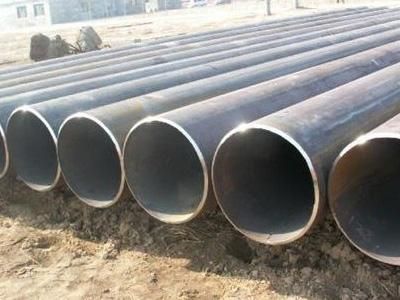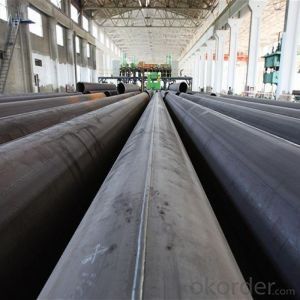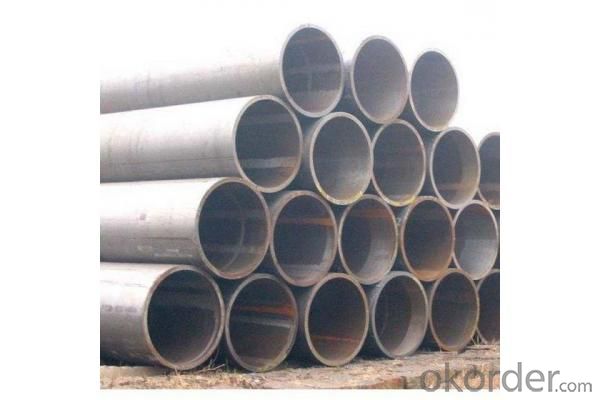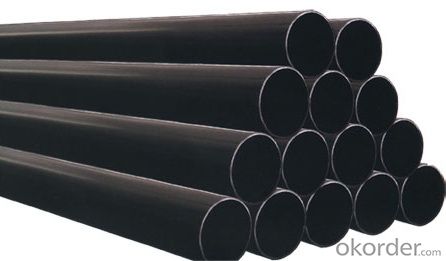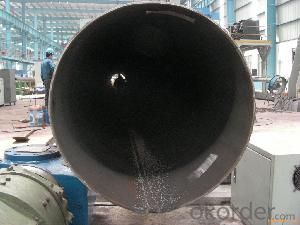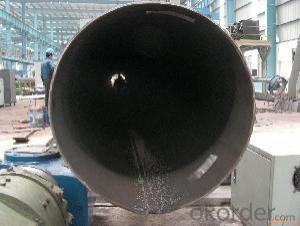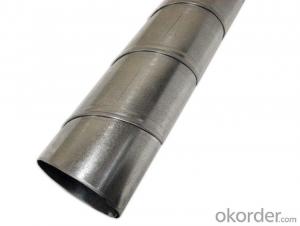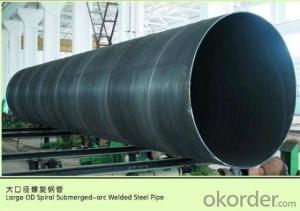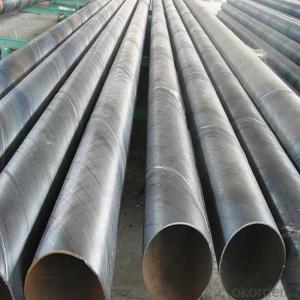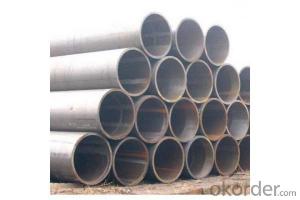LSAW SSAW CARBON STEEL PIPE ASTM API 10''
- Loading Port:
- Tianjin
- Payment Terms:
- TT OR LC
- Min Order Qty:
- 1 m.t.
- Supply Capability:
- 3000 m.t./month
OKorder Service Pledge
OKorder Financial Service
You Might Also Like
Packaging & Delivery
Packaging Detail: | Normal exporting packing,in container or bulk vessel or as per clients' request |
Delivery Detail: | 2 months after confimed contract |
Specifications
Large Diameter API 5L X70 PSL2 LSAW Steel Pipe
Grade: X42, X46, X50, X52, X60, B, C
OD: 1.5"-28"
WT: SCH10-SCH160
Large Diameter API 5L X70 PSL2 LSAW Steel Pipe
Specifications:
u Standard: API 5L
u Grade: B, C, X42, X46, X50, X52, X56, X60, X65, X70, X80
u OD: 1.5"-28"
u WT: SCH10-SCH160
u Length: 5-12m
u Ends Finish: plain end, bevel end, grooved end
u Surface Treatment: bare, black varnished, oiled finish, red color, anti-corrosion, 3PE, FBE or epoxy coating
u Technique: hot rolled or cold drawn
u Application: api 5l steel pipe for conveying oil, water, gas
u Invoicing: based on theoretical weight or actual weight
u Payment Terms: L/C at sight, T/T or Western Union
u Trade Terms: FOB, CFR, CIF
u Certification: ABS manufacturing assessment, ABS design assessment, API 5CT, API 5L, DNV manufacturer certificate, ISO9001 quality management system certificate, ISO14001 environment management system certificate, GB/T28001 occupational health and safety management system certificate, A1 class manufacturing license of special equipment certificate, CCS, GL, LR, SGS, TüV, PDE
- Q: How are steel pipes used in the fabrication of storage tanks?
- Steel pipes are commonly used in the fabrication of storage tanks due to their strength, durability, and versatility. These pipes serve various purposes throughout the tank fabrication process. Firstly, steel pipes are used for the construction of the tank's foundation. They provide a sturdy base for the tank, ensuring stability and preventing any potential structural issues. During the tank fabrication process, steel pipes are also used for the construction of the tank's shell. These pipes are welded together to create a cylindrical structure that can withstand the pressure and weight of the stored material. Furthermore, steel pipes are utilized for the installation of inlet and outlet pipes. These pipes allow for the controlled flow of materials into and out of the storage tank. Additionally, steel pipes are often used for the fabrication of support structures within the tank. These structures help to distribute the weight of the stored material and provide additional reinforcement to the tank. In terms of maintenance and repair, steel pipes are also essential. They are used for the installation of access points, such as manholes or inspection ports, which allow for routine inspections, cleaning, and any necessary repairs. Overall, steel pipes play a crucial role in the fabrication of storage tanks by providing a strong and reliable framework. They are used for the construction of the tank's foundation, shell, inlet and outlet pipes, support structures, and access points. With their durability and versatility, steel pipes ensure the integrity and functionality of storage tanks.
- Q: Will the steel tube dance?
- In a single pole dance performance, the dancer moves more naturally, herself, moves and techniques, and does what she wants to do, while the style of dance is determined by herself, no one intervenes, and quite free.
- Q: How do steel pipes perform in extreme weather conditions?
- Steel pipes are highly resilient and perform exceptionally well in extreme weather conditions. They have excellent resistance to corrosion, impact, and temperature variations, making them ideal for withstanding harsh environments such as extreme heat, cold, and heavy rainfall. Moreover, steel pipes are known for their durability and strength, ensuring that they can withstand the forces exerted by high winds, snow, and even seismic activities. Overall, steel pipes are a reliable choice for various applications in extreme weather conditions.
- Q: How are steel pipes used in the construction of bridges?
- Steel pipes are commonly used in the construction of bridges as they provide structural support and stability. These pipes are used for various purposes, such as creating the framework, piling, and supporting the bridge's weight. Additionally, steel pipes are often used in the construction of bridge piers and abutments, as well as for drainage systems and utility tunnels. Their high strength and durability make steel pipes essential components in ensuring the safety and longevity of bridge structures.
- Q: What are the different grades of steel used for pipes?
- There are several different grades of steel used for pipes, each with their own specific properties and applications. Some of the most commonly used grades include: 1. Carbon Steel: This is the most common type of steel used for pipes and is typically used in low-pressure applications. It has a low carbon content, usually less than 0.30%, which makes it easy to weld and form. Carbon steel pipes are durable and cost-effective, making them suitable for a wide range of industries. 2. Stainless Steel: Stainless steel pipes are known for their corrosion resistance and high strength. They are made from an alloy of iron and chromium, with additional elements like nickel and molybdenum to enhance their properties. Stainless steel pipes are commonly used in industries such as chemical, food processing, and oil and gas, where corrosion resistance is crucial. 3. Alloy Steel: Alloy steel pipes are made by adding elements such as manganese, chromium, or nickel to carbon steel. This enhances their strength, hardness, and resistance to wear, making them suitable for high-pressure and high-temperature applications. Alloy steel pipes are commonly used in industries such as power generation, petrochemical, and aerospace. 4. Duplex Steel: Duplex steel is a type of stainless steel that contains a combination of austenite and ferrite phases. This results in a material with excellent strength, corrosion resistance, and toughness. Duplex steel pipes are commonly used in offshore oil and gas platforms, as well as in chemical and petrochemical industries. 5. Low-Temperature Steel: Low-temperature steel is designed to withstand extremely cold temperatures without becoming brittle. These pipes are typically used in industries such as cryogenic storage, LNG (liquefied natural gas) transportation, and refrigeration. It is important to select the appropriate grade of steel for a specific application to ensure the pipe's performance and longevity. Factors such as temperature, pressure, corrosion resistance, and cost should be considered when choosing the grade of steel for pipes.
- Q: What is the difference between steel pipe and HDPE pipe?
- Steel pipe and HDPE pipe have different compositions and characteristics, making them suitable for various applications. Steel pipe, made of steel, is a robust and durable material commonly used in industrial and infrastructure projects that require strength and reliability. It can withstand high pressure, temperature, and heavy loads, and is resistant to corrosion for both above-ground and underground installations. On the other hand, HDPE pipe is composed of high-density polyethylene, a plastic polymer. These pipes are lightweight, flexible, and easy to install, making them ideal for water supply, drainage systems, and agricultural irrigation. They are resistant to chemicals, abrasion, and UV rays, making them suitable for indoor and outdoor use. HDPE pipes also have a long service life and require low maintenance. In terms of cost, steel pipes are generally more expensive due to the raw materials and manufacturing process involved. However, they are chosen for their superior strength and durability in applications with high pressure or extreme conditions. HDPE pipes offer a cost-effective solution for applications that don't require the same level of strength and durability. In summary, the differences between steel pipe and HDPE pipe lie in their composition, strength, durability, and cost. Steel pipe is known for its strength and reliability, while HDPE pipe offers flexibility, easy installation, and resistance to chemicals and UV rays. The choice between the two depends on the specific application and project requirements.
- Q: Galvanized steel pipe DN100 and SC100
- DN is the meaning of "bore", also expressed in water supply and drainageSC is welded steel pipe, generally GB tube, that is, thick walled steel pipe, look at the design requirementsMT refers to the wire tube, usually thin-walled tube, there are KBG and JDG
- Q: Are steel pipes suitable for solar power plants?
- Yes, steel pipes are suitable for solar power plants. Steel pipes are often used in the construction of solar power plants due to their durability, strength, and resistance to corrosion. They can be used for various purposes in a solar power plant, including the transportation of fluids such as water or heat transfer fluids, as well as providing structural support for solar panels and other equipment. Steel pipes are capable of withstanding high temperatures and pressure, making them ideal for the efficient operation of solar power plants. Additionally, steel pipes are readily available and cost-effective, making them a popular choice in the construction of solar power plants.
- Q: How are steel pipes used in the construction of biomass power plants?
- Steel pipes are commonly used in the construction of biomass power plants for various purposes. They are used to transport and distribute water, steam, and other fluids within the plant, as well as to carry and contain biomass fuel, such as wood chips or agricultural waste. Steel pipes are also used for structural purposes, providing support for equipment and structures within the plant. Additionally, they are used for exhaust systems and ventilation, ensuring the safe release of gases and managing air circulation. Overall, steel pipes play a crucial role in the efficient and reliable operation of biomass power plants.
- Q: What are the factors to consider when selecting steel pipes?
- Some factors to consider when selecting steel pipes include the intended application and environment, the required strength and durability, the size and thickness of the pipes, the corrosion resistance, the cost, and the availability of different types of steel pipes.
Send your message to us
LSAW SSAW CARBON STEEL PIPE ASTM API 10''
- Loading Port:
- Tianjin
- Payment Terms:
- TT OR LC
- Min Order Qty:
- 1 m.t.
- Supply Capability:
- 3000 m.t./month
OKorder Service Pledge
OKorder Financial Service
Similar products
Hot products
Hot Searches
Related keywords
